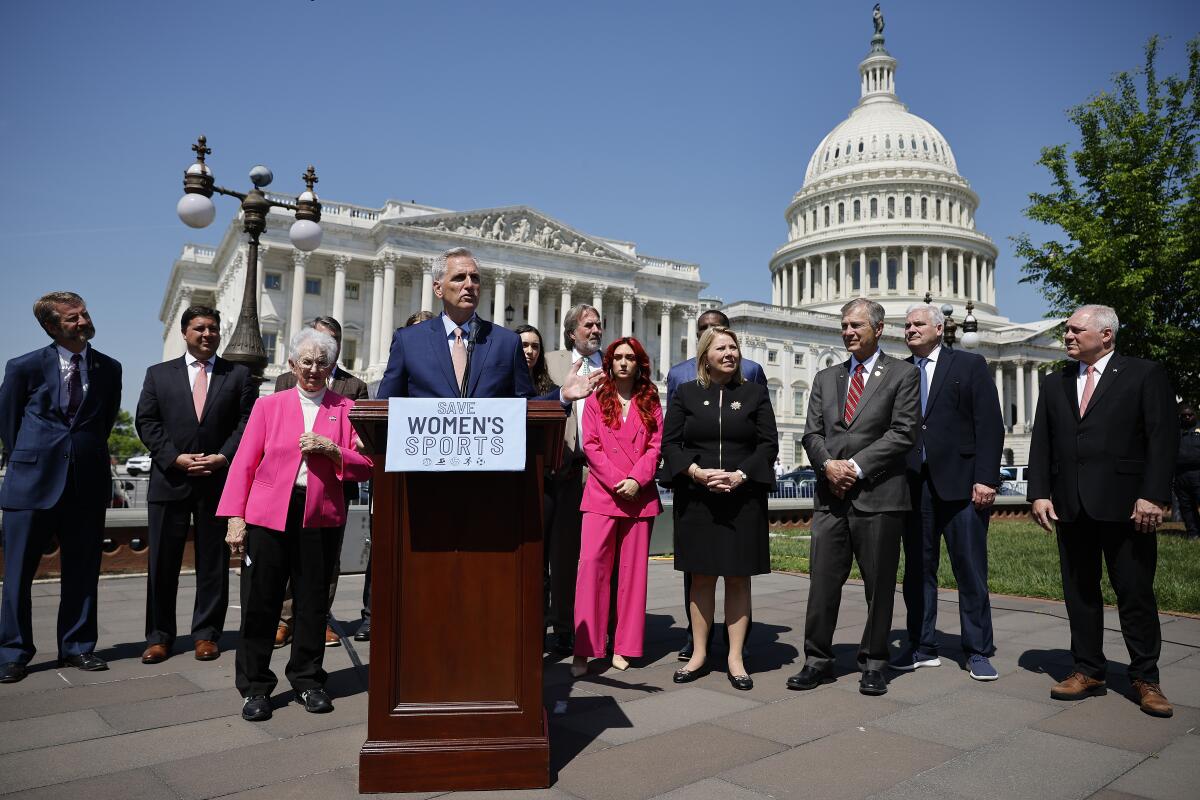Column: The NCAA’s dilemma about trans athletes shouldn’t be that hard of a call

- Share via
The National Collegiate Athletic Assn. is under pressure to draft an impossible piece of policy: a stance on transgender athletes that makes progressives and conservatives happy. The best it’s come up with so far is to say late last month that its rules are “under review,” after a smaller student-athlete association effectively banned trans women from competing in women’s sports.
Opinion Columnist
LZ Granderson
LZ Granderson writes about culture, politics, sports and navigating life in America.
It’s the latest development in a conversation that has been blown way out of proportion by opportunistic conservative politicians, many of whom pushed for bans on transgender athletes even though the politicians couldn’t point to any real-world problems as a result of trans participation in sports. That didn’t deter Rep. Gregory W. Steube (R-Fla.) from authoring his Protection of Women and Girls in Sports Act, which passed in the House last year.
I hope that the NCAA’s decision-makers are guided by better intentions and science than lawmakers were. And they will be if they first answer one fundamental question: Why do we play?
House Republicans’ antisemitism law is political theater at a moment when issues need real debate.
Few have spent as much time trying to answer that as psychiatrist and author Stuart Brown, founder of the National Institute for Play. He has spent four decades interviewing thousands about their childhoods, gathering data that he says add up to the same conclusion: “Play is more than just fun.” It’s key in our development as young children and anchors our mental and physical well-being as adults. Sports is one pursuit in which many people are comfortable continuing to play when they feel too old or self-conscious to use their imaginations. Sports let us continue to grow through play in later childhood and in adulthood.
To study play, Brown had to define it. Here’s one rule of thumb: “If its purpose is more important than the act of doing it, it’s probably not play.”
Breezy marketing from DraftKings and similar companies is the modern equivalent of the Marlboro Man. But there’s more corruption in betting than there was in tobacco.
Sounds simple enough. It should apply to sports. The complication in college athletics is that economics — not just politics — has added layers of purpose that have overtaken the intrinsic value of playing a sport. This reaches beyond the business world and its billions of dollars in television deals, merchandise, video games, legalized online gambling and of course compensation. The hope of getting scholarships is a main reason many parents push their children to specialize in one sport, despite research suggesting that could be harmful.
If the NCAA is trying to make everyone happy with a ruling on trans athletes, it will undoubtedly fail. But if leaders are guided by the association’s original purpose — which was not to make money off of student-athletes but rather to protect them from outside factors such as politics — then it would be easier to create a policy colleges and athletes can live with.
Make no mistake, politics is the reason the NCAA is reviewing its policy on trans athletes, which allows participation in some sports under complicated medical criteria. An estimated 40 of the NCAA’s more than 500,000 athletes are thought to be transgender, so this is not some crisis that’s bubbling over. That doesn’t mean questions regarding the latest scientific thinking as well as fairness for all athletes are not valid. Only that the panic over transgender athletes is part of a larger Republican agenda to attack the LGBTQ+ community for political gain.
Drag.
Book bans.
Transgender care.
Iowa’s still trying to find a way to ban same-sex marriage.
Remember when Republicans warned that the military was going to collapse if Democrats repealed “don’t ask, don’t tell”? Or that society would collapse with marriage equality? And now we’re being told that women’s sports will disappear if transgender athletes aren’t banned.
That doesn’t mean the policy the NCAA currently has in place is perfect. But it’s a reminder that the policy is not causing problems. Trans athletes are not causing problems. Politicians are just pretending they are for cheap political points.
That’s another distraction from play, which is supposed to be the basis of sports. When play is at its best, it includes as many people as possible. Politics try to taint play and with the opposite impulse, seeking to divide — think of the Boston Marathon’s ban on women or the reason we celebrate Jackie Robinson Day. Time and time again we find that sports is better when we find ways so that we all can play. Ultimately the approach that better serves colleges and athletes may not be the one politicians like. And that’s fine. The NCAA’s decision shouldn’t be based on politics anyway.
More to Read
A cure for the common opinion
Get thought-provoking perspectives with our weekly newsletter.
You may occasionally receive promotional content from the Los Angeles Times.














